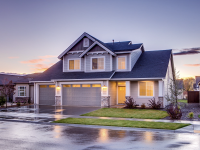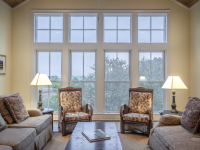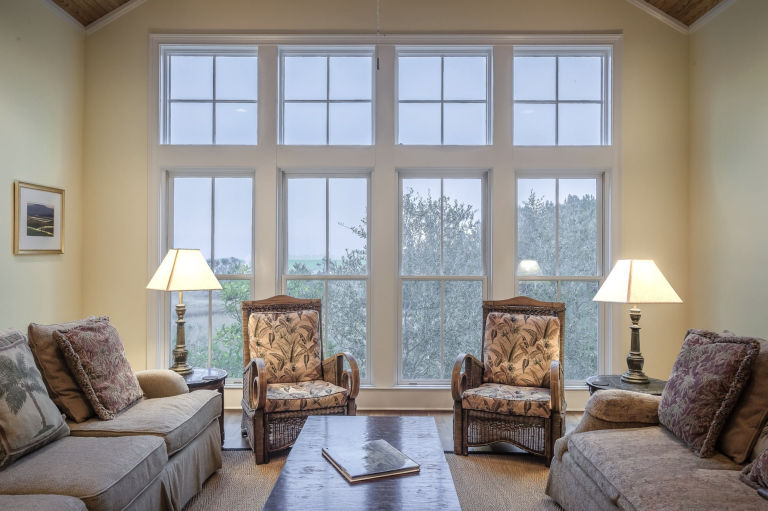Believe it or not, double-glazed windows were actually invented in the 1930’s. However, it took until the 70’s and 80’s for double glazing to become standard. This is due to the fact a lot of houses were built before the 1930s and even after the invention of double glazing, many houses were still built with single-glazed windows. In fact, it wasn’t until 2002 that the UK Government made double glazing windows compulsory for homes getting replacement windows. This has meant that since then as more windows have been broken for a range of reasons there has been a steady increase in the adoption towards double-glazed windows. When getting new windows installed in your home you should hire a window installation contractor specialist, this will drastically reduce the chances of any mistakes occurring which could in turn reduce the efficacy of your windows in the long run.
How Do Multi Glazed Windows Work?
Double glazed windows trap a layer of air, which works as a natural insulator between two panes of glass. This means that the insulating effect of multi glazed windows prevents heat from escaping through the window. Most multi glazed windows also have a metallic coating that reflects heat back into the room whilst allowing heat from the sun to pass through from outside.
To achieve a greater level of energy efficiency you can buy triple glazing windows, these are not mainstream just yet but they can be a fantastic way to reduce your heating bills, particularly in times when we are all faced with rising heating bills. Triple glazed windows work in the same way as double glazed windows; only they have 3 layers of glass instead of two and two layers of trapped air, triple glazing allows even less heat to escape than double glazing.
You can even find quadruple-glazed windows on the market, however these are not easy to find and are extremely expensive at the moment. Costing more than 60% more than the cost of double glazed windows. As demand increases in the future for both triple and quadruple glazing windows they will reduce in price.
Increased Energy Efficiency
Multi glazed windows help to minimise the amount of heat that escapes out of your windows. If you want to increase the efficiency of your house make sure that you have at least double glazed windows on all your exterior windows including any windows on your front or back doors. Having increased energy efficiency in your house can allow you to be less reliant on heating up your home, meaning that you will save money and reduce your burden on the environment.
Multi glazed Windows Reduce Noise Transfer
Multi glazed windows can reduce the amount of noise transfer between the inside and outside of your home. This is because the more layers of glass are between you and the noise source on the other side of the window the fewer sound vibrations that will reach your ears, this effectively means that the sound on the other side of the window will seem quieter. Additionally, the larger the gap is between the panels of glass in your muli-glazed window the better your acoustic insulation will be. Multi glazed windows can be a great investment if outside noises are affecting your happiness within your house.
Smart Windows
Smart windows may be what you think of if you have ever thought about the future of windows in your home. They have a range of technologies under the hood which can improve the functionality and energy efficacy of your windows. Here are some common features found in smart windows:
-
- Dynamic Transparency: Smart windows can automatically change the transparency based on the available light hitting the windows or you can manually change the transparency on your windows. You can in fact use dynamic transparency instead of traditional curtains.
- Integrated Sensors: Smart windows have sensors that monitor environmental factors such as temperature, light levels and even air quality.
- Energy Efficiency: Smart windows can adapt to outside conditions to maximise the energy efficacy of the window. They can automatically detect the temperature outside and if it is warmer outside it can reduce heat gain and if it is colder outside it can automatically increase heat retention.
- Connectivity And Automation: Smart windows can be connected to a smart home system which allows you to quickly and easily make alterations to your smart windows around your house. For example, if you are about to go on holiday you can make sure that all of your windows are to the desired setting before leaving your house. Additionally, many of these smart home systems allow you to make changes remotely on your mobile phone.
- UV Protection: Ultraviolet rays from the sun can cause damage to the interiors of your home, discolouring furniture that is placed near windows that regularly have the sun shining through them. UV protection can reduce or block the UV rays from getting through your windows.
Pros And Cons Of Smart Windows
Pros
- Energy Efficiency: Smart Windows can help you manage your energy usage by making changes to the solar heat gain properties within the windows. Ensuring that an increased amount of heat is retained during colder months, whereas in warmer months your windows can actually reduce heat gain. This means that you will be less reliant on home heating and cooling systems, which will save you money on your household bills.
- Comfort And Privacy: Smart windows can allow you to easily customise your privacy and control the amount of sunlight coming through your window.
- Reduced Glare: The majority of smart windows automatically reduce the amount of tint meaning that there is reduced glare from outside on screens. Smart windows can be particularly good if you have a home cinema projector system set up as these systems require the room to be very dark for them to look good.
- UV Protection: Smart windows can block harmful UV rays which can damage your furniture.
- Noise Reduction: Smart windows can reduce the amount of noise that passes through the window.
Cons
- Cost: The cost of replacing smart windows can be more expensive than traditional windows, which could increase the upkeep costs of your house.
- Compatibility: If you have an existing smart home system it is important to make sure that your new smart windows are compatible with the smart home system. More often than not they are incompatible.
- Installation And Maintenance: Smart windows require a professional to install them and they are more difficult to clean, you may have to end up paying a specialised company to ensure that your window is given a thorough clean possibly up to a few times a year.
- Reliability: Smart windows are a relatively new technology, new technologies are often subject to occasional glitches or malfunctions which may require troubleshooting and repairs which both come at a cost.
- Learning Curve: New technologies require time and patience to learn.
Conclusion
Exploring the options available to you in terms of upgrading your current external windows can provide a myriad of benefits which can offer both increased convenience and cost savings.


















